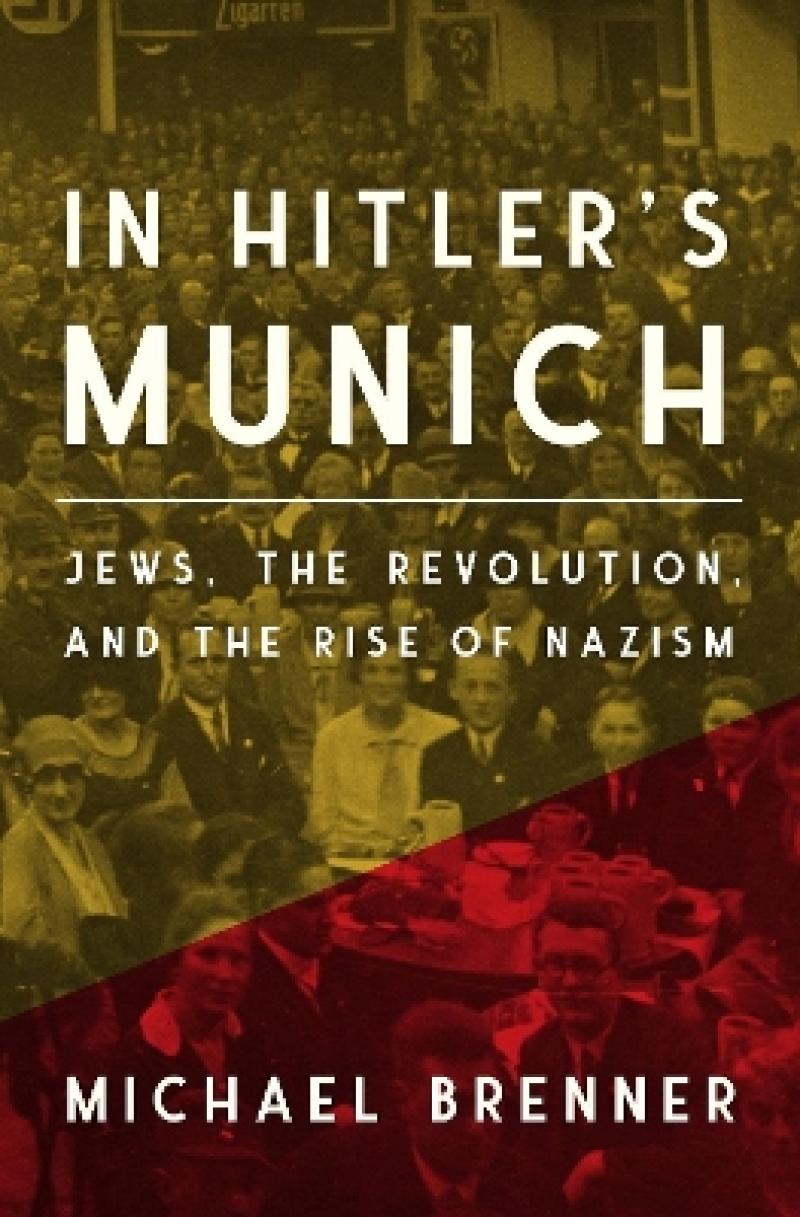"Munich as the point of origin for the explosion of antisemitism in Germany in the early 1920s is the focus of <i>In Hitler’s Munich</i>. For Michael Brenner what mattered most was not the reprieve Jews experienced in 1923 but the failed revolution of 1918–1919 that put them at so much risk in the first place."<b>---Christopher R. Browning, <i>New York Review of Books</i></b>
"Michael Brenner. . . has written a book that tells the tragic story of the city and its Jews after World War I without fear or favor and, indeed, in this particular case, without either pride or shame."<b>---Steven E. Aschheim, <i>Jewish Review of Books</i></b>
"<i>In Hitler’s Munich: Jews, the Revolution and the Rise of Nazism</i> explores the great variety of roles played by Munich’s Jews in those years, putting to rest any simple characterization of pre-World War II German Jewry."<b>---Robert Siegel, <i>Moment</i></b>
"In his excellent new book, the noted German Jewish historian Michael Brenner explains and analyses how and why Munich became the bedrock of Nazism."<b>---Colin Shindler, <i>Jewish Chronicle</i></b>
"Brenner’s scholarship is rigorous and impressive. . . . [He] never lets us forget that these were people, not just figures in a historical text. . . . Although he did not intend or foresee it when he began to write, it quickly became apparent to him that what he was describing resonated uncomfortably with the events of January 6th, 2020 — the storming of the Capitol in Washington. At every turn the reader is reminded of the lessons of history."<b>---Mark Welch, <i>Jewish Book Council</i></b>
"Deep, important research by a master historian."
Kirkus Reviews
"An indispensable account of how, after the failed left-wing November Revolution of 1918–19 in Munich, the new conservative government of Germany promoted the lie that Jews were responsible for Germany's defeat in World War I and the rise of Bolshevism in Germany. . . . Highly recommended."
Choice Reviews
"Magnificent. . . a careful, erudite, imaginative and beautifully written book that brings us deep into the world that produced Adolf Hitler."<b>---Helmut Walser Smith, <i>Antisemitism Studies</i></b>
"Michael Brenner. . . provides important lessons which might help thwart the ongoing collapse of democracies across the world. . . . the book is a timely lesson on how it’s imperative to shake up people gullible enough to fall into the trap of manufactured lies and give their unequivocal allegiance to forces that silently work towards genocidal politics and the weakening of the fabric of constitutional democracy. As democracies are imperilled, Brenner’s relevant account of the anti-Semitic discourse that underpinned the early years of Hitler’s quest for power becomes a wake-up call."<b>---Shelley Walia, <i>The Hindu</i></b>
"Anyone who wants to understand the rise of the Nazis would do well to read Brenner's book."<b>---Sabine Beppler-Spahl, <i>Radicalism of Fools: Rethinking Anti-Semitism</i></b>
"Immensely readable and well-searched. . . . Brenner’s work brilliantly reveals how antisemitism rose from Munich’s gutters to dominate early interwar society and politics."<b>---Kevin Spicer, <i>Contemporary Church History Quarterly </i></b>
"[A] significant new contribution to the study of Weimar politics and the rise of Nazism."<b>---Dana Smith, <i>German Studies Review</i></b>
From acclaimed historian Michael Brenner, a mesmerizing portrait of Munich in the early years of Hitler's quest for power
In the aftermath of Germany's defeat in World War I and the failed November Revolution of 1918–19, the conservative government of Bavaria identified Jews with left-wing radicalism. Munich became a hotbed of right-wing extremism, with synagogues under attack and Jews physically assaulted in the streets. It was here that Adolf Hitler established the Nazi movement and developed his antisemitic ideas. Michael Brenner provides a gripping account of how Bavaria's capital city became the testing ground for Nazism and the Final Solution.
In an electrifying narrative that takes readers from Hitler's return to Munich following the armistice to his calamitous Beer Hall Putsch in 1923, Brenner demonstrates why the city's transformation is crucial for understanding the Nazi era and the tragedy of the Holocaust. Brenner describes how Hitler and his followers terrorized Munich's Jews and were aided by politicians, judges, police, and ordinary residents. He shows how the city's Jews responded to the antisemitic backlash in many different ways—by declaring their loyalty to the state, by avoiding public life, or by abandoning the city altogether.
Drawing on a wealth of previously unknown documents, In Hitler's Munich reveals the untold story of how a once-cosmopolitan city became, in the words of Thomas Mann, "the city of Hitler."
“Michael Brenner’s masterful book offers important lessons for us today about the fragility of democracies, the consequences of unchecked antisemitic conspiracy theories, and the willingness of self-serving political elites to aid and abet the rise to power of populist demagogues. This is a scintillating and profoundly important work of scholarship.”—John M. Efron, author of German Jewry and the Allure of the Sephardic
“Brenner shows that in many respects it was the Bavarian capital that helped make Hitler what he became. Filled with characters notable for their brilliance or repulsiveness (and sometimes both), his narrative demolishes numerous myths and helps us understand how quickly and thoroughly apparently broad-minded folk can turn into racist bigots. A fine and necessary book.”—Frederick Taylor, author of 1939: A People’s History of the Coming of the Second World War
“Set in what Thomas Mann recognized as ‘the city of Hitler’ already in 1923, this unusually intimate account of revolution and counterrevolution reveals how unexpectedly crossed relationships between Jews, revolutionaries, and antisemites turned unforgiving and lethal in a few short years.”—Peter Fritzsche, author of Hitler’s First Hundred Days: When Germans Embraced the Third Reich
"A striking, extremely important work. Brenner shows how the events in Munich were crucial to the rise of the Nazi movement and led to the antisemitic violence in the years after Hitler's ascension to power."—Michael Berkowitz, author of The Crime of My Very Existence: Nazism and the Myth of Jewish Criminality
"A dazzling book filled with vivid insights and poignant historical ironies on nearly every page. Brenner has written one of the most nuanced collective portraits of twentieth-century German Jewish lives and identities that I know."—Paul Hanebrink, author of A Specter Haunting Europe: The Myth of Judeo-Bolshevism

